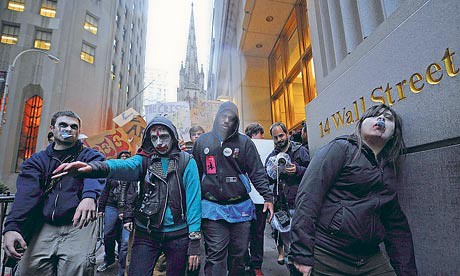"Joseph Keller doesn't expect he'll live to see the end of 2013. He blames the house at 190 Avondale Avenue.
Five years ago, Keller, 10 months behind on his mortgage payments, received notice of a foreclosure judgment from JP Morgan Chase. In a few weeks, the bank said, his three-story house with gray vinyl siding in Columbus, Ohio, would be put up for auction at a sheriff's sale.
The 58-year-old former social worker and his wife, Jennifer, packed up their home of 13 years and moved in with their daughter. Joseph thought he would never have anything to do with the house again. And for about a year, he didn't.
Then it started to stalk him."
- In 2010, the county sued Keller because the house, already picked clean by scavengers, was in a shambles, its hanging gutters and collapsed garage in violation of local housing code.
- The tax collector started sending Keller notices about mounting back taxes, sewer fees and bills for weed and waste removal.
- Last year, Chase's debt collector began pressing Keller to pay his mortgage, which had swollen, with penalties and fees, from $62,100.27 to $84,194.69.
- Worst of all, last January, the Social Security Administration rejected Keller's application for disability benefits; the "asset" on Avondale Avenue rendered him ineligible. Keller's medical problems include advanced liver disease, hepatitis C and inactive tuberculosis. Without disability coverage, he can't get the liver transplant he needs to stay alive.
Mr. Keller is still legally responsible for the home he left after the bank foreclosure notice, because months later, Chase filed to dismiss the foreclosure judgment and the order of sale.
The Kellers are caught up in a little-known horror of the U.S. housing bust: the zombie title. Six years in, thousands of homeowners are finding themselves legally liable for houses they didn't know they still owned after banks decided it wasn't worth their while to complete foreclosures on them. With impunity, banks have been walking away from foreclosures much the way some homeowners walked away from their mortgages when the housing market first crashed.
...
Since 2006, 10 million homes have fallen into foreclosure, according to RealtyTrac, a number that in earlier, more stable times would have taken nearly two decades to reach. Of those foreclosures, more than 2 million have never come out. Some may be occupied by owners who have been living gratis. Others have been caught up in what is now known as the robo-signing scandal, when banks spun out reams of fraudulent documents to foreclose quickly on as many homeowners as they could.And then there are cases like the Kellers, in which homeowners moved out after receiving notice of a foreclosure sale, thinking they were leaving the house in bank. No national databases track zombie titles. But dozens of housing court judges, code enforcement officials, lawyers and other professionals involved in foreclosures across the country tell Reuters that these titles number in the many thousands, and that the problem is worsening.
Banks are able to walk away from homes that they won't be able to sell for what's owed them after foreclosure, reap the insurance, tax and accounting benefits from documenting the loss as well as sell the unpaid debt to debt collectors.
Unfortunately for the homeowners, of course their credit suffers endlessly. Wages can be garnished, income tax refunds confiscated, fines and fees for everything from not keeping the lawn on the vacant home mowed to tens of thousands of dollars for demolition and clean-up of the remaining lot. Then there are the summonses to appear in court. In some cities, people with zombie titles can be sentenced to probation and even jail if they don't bring their homes into compliance.
Cities, too, are struggling to deal with the rising number of blighted properties, and again, the banks claim zero responsibility.
Two settlement "deals" with the Big Banks, and still, no protection for the victims of their crimes.
Joe Smith, who is the monitor of the National Mortgage Settlement, recommends that borrowers with zombie titles contact their state's attorney general and remember that the Settlement does not preclude borrowers from taking their own legal action."
A Social Security administrative judge told Mr. Keller that he would review his appeal of the original denial of benefits, a process that he said could take two months. Keller replied that he might not be around that long. He is still without benefits.














